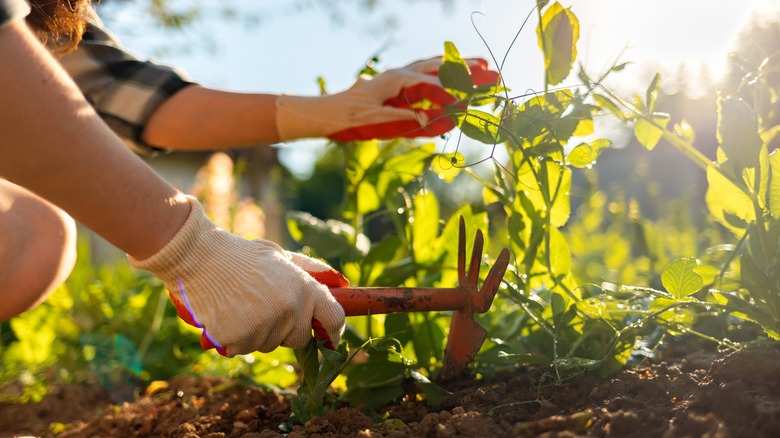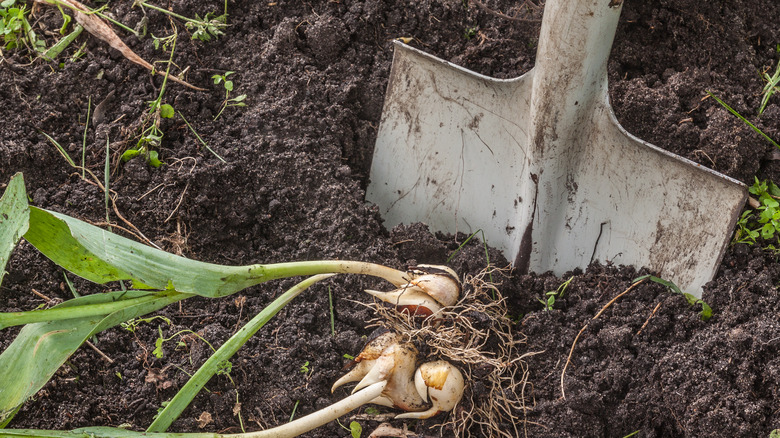How To Prepare Your Garden For Winter, According To An Expert – Exclusive
After the summer's harvest is done, you may notice your garden is starting to look a bit worn, perhaps with vines dying off and leaves wilting. Your plants are no longer producing — or growth has slowed significantly — and the last ripe tomato of the season has been picked. If you have a flower garden, the blooms may be starting to fade a bit at this point, or have already shriveled up. Perhaps you've checked your calendar and know the first frost for the season is likely on its way, too (via Fox Weather).
However, even as things wind down naturally, there is still quite a bit to do to get the most out of your garden. It's not time to sit back or hunker down; doing a bit of work at this time of year can offer some big improvements in the coming one. What specifically should you tackle, then? In an exclusive interview with House Digest, Craig Wilson, the Director of Gardener's Dream Ltd., offers advice and guidance on how to prep your garden for the winter season.
Weed and prune to prepare for the cold
It's somewhat easy to just step away from your plants at this time of the year, believing there's nothing more to do. However, if you have perennials or plants that are supposed to re-emerge down the road, you'll want to take special care of them now, during the fall months. "Preparing your garden for winter can help keep your plants healthy so they can come back in full bloom the following spring," says Craig Wilson. "Wedding your garden and pruning any diseased plants will keep everything nice and trim for the season."
Depending on the type of plant, you may wish to cut things back significantly every autumn to encourage better blooms next year. To that end, it's a good idea to look up the best time to prune based on the species. Look for disease on the leaves and stems, too, such as areas impacted by insects. This could give you a clue about what type of care your plants may need next year.
Make sure your garden is fertilized
How did the soil do for your garden this year? Did your plants grow as expected? If not, consider what you could do to boost its quality next year. "While it's common to fertilize your garden with compost in the spring, doing so in the fall can give your plants extra nourishment for the winter," Craig Wilson explains. As for what to add to your soil, consider a test that will give you some insight into which nutrients it is lacking.
Adding nourishment is a solid first step, but don't stop there; consider adding a layer of quality mulch to the garden as well. "The mulch will keep those nutrients locked in when the winter storms hit," Wilson continues. As the mulch breaks down from the weather and seasonal changes, it adds even more value to the soil, providing a potentially better foundation for next year's garden.
Rearrange what doesn't work
Take into consideration how your garden looked and functioned in the last season. Perhaps everything was well-organized and grew perfectly. That's not always the case, though, so if you're nodding your head, now is the time to make changes. "If there was anything in your garden that didn't work well, such as plants being too crowded or not being in an ideal spot for sunlight, consider digging up the bulbs and replanting them elsewhere," Craig Wilson suggests. "Rearranging your garden helps the plants thrive, so they're getting the space they need to grow as well as getting the right amount of sun and water."
You may also wish to think about your annuals now and jot down some notes, especially while this year's results are fresh in your mind. Could changing the layout a bit offer a better result due to improved access to nutrients? Provide better access to sunlight? Etc.
Plant cover crops
Cover crops are plants added to a garden for the specific purpose of improving or preserving the soil, according to Sustainable Agriculture Research and Education. "This will protect your plants from the worst of the frost while keeping the soil active to prevent erosion," Craig Wilson reveals.
Choose which cover crops to plant based on the unique needs of your soil. If you need to adjust the nitrogen balance, consider the use of legumes as they add to the organic matter in the garden significantly. Non-legumes, such as rye, oats, and wheat, are great for reducing high nitrogen levels. They also work well for reducing weed spread.
Though it is an investment in your garden to be sure, Wilson believes making these changes to prepare for winter are worthwhile. "Doing all you can to prepare your garden for the winter will give your yard the boost it needs to come back fresh and blooming in the spring," he adds.




